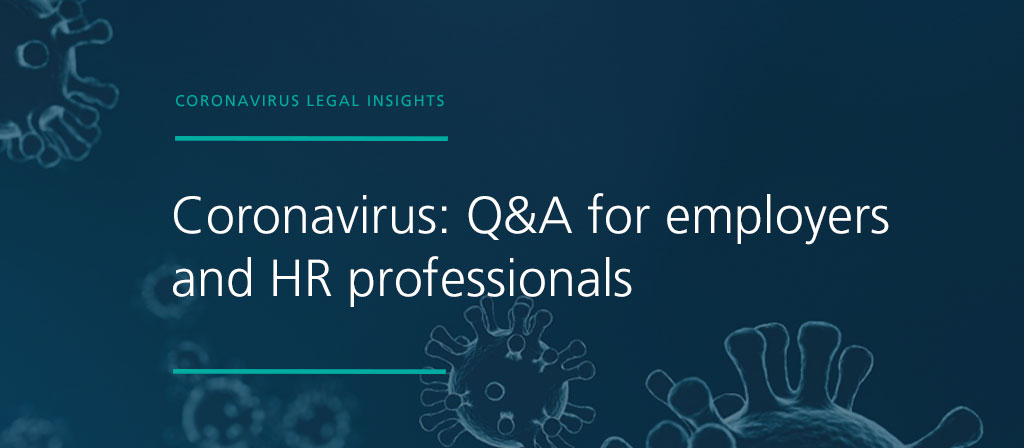Coronavirus: Q&A for employers and HR professionals

The last few weeks have seen a seismic shift in the numbers of the UK workforce now working from home, following the coronavirus lockdown.
While businesses should always seek employment law advice that is specific their individual circumstances, here, our legal experts answer a few common questions about employers’ rights and responsibilities during the COVID-19 outbreak.
Overview
- My employee is sick with COVID-19 symptoms but cannot provide a sick note. What should I do?
- What equipment do I need to provide to employees working from home?
- Can I lay off workers without repercussions?
- What about if I just need to reduce my staff’s hours?
- Can I ask staff to use their annual leave when I do not need them to work?
- Do I have to pay my employee if they are not working due to self-isolation?
- Can I ban an employee who refuses to self-isolate from the office?
- An employee thinks they have coronavirus – can I inform their co-workers?
- What can I do if my employee doesn’t want to work because they are afraid of catching coronavirus?
My employee is sick with COVID-19 symptoms but cannot provide a sick note. What should I do?
Employees are able to self-certify for the first seven consecutive days of illness. After this, you are able to ask them for evidence of incapacity, such as a fit note from their doctor.
However, due to unprecedented demand on GP services, employees who:
- have COVID 19 symptoms; or
- are self-isolating because they live with someone who has COVID-19 symptoms, can now obtain a new ‘isolation note’, via the NHS website, which will sign them off work.
This is a simple process for the employee. They will need to answer some questions online, and if they qualify for an isolation note, the note will be emailed to them. If the person does not have a computer, someone else can do it on their behalf.
My employees are able to work from home, but they’ve never done this before. What equipment do I need to provide them with?
Home-working has become the ‘new normal’ for many workers, and can be a difficult change for those who are used to a structured office environment.
A reasonable amount of flexibility should be expected from employer and employee.
Employers should keep a regular dialogue with their employees, ensuring they have all the equipment and resources they need to do their job properly and safely. You should consider their individual needs, such as a disability or serious health condition, and how this may impact on their ability to work in a different environment. If your employee has children, you may need to come to a reasonable agreement with them, which may involve considerations such as working altered hours.
It continues to be your responsibility under health and safety legislation to ensure that your employees have a safe place of work, a safe system of work and a safe means of access to work, even when they are working from home. As you can’t visit them at the moment to carry out a risk assessment, you should ask them to carry out a self-assessment.
Whilst the change can be disruptive, employees are still bound by their terms and conditions of employment and are expected to undertake their duties and conduct themselves in the usual way. Working from home is not an opportunity to ‘take it easy’ and any conduct or performance issues should be dealt with in the usual way, and in accordance with your policies.
Due to the economic impact of COVID-19, I may need to lay off some of my workers. Can I do this without repercussions?
You may not need to lay off staff permanently.
Under the ‘Coronavirus Job Retention Scheme’, the government has created the new concept of ‘Furloughing’ employees. There is currently no legal definition of ‘Furloughing’, but in principle, it means employers will be able to apply to HMRC to pay the wages of workers who are ‘furloughed’. Employees must be notified in writing that they are being furloughed, and you should ask an employment lawyer to help you with this to avoid future repercussions.
If you are going to reduce their pay to 80% (or the £2,500 cap) during the furlough period, you will need to gain their agreement to being furloughed, and should record this in writing.
Under the Coronavirus Job Retention Scheme, the Government will provide employers with financial support towards the cost of employing those workers who are furloughed. Employers will be able to apply to HMRC for reimbursement of 80% of the wage costs of the furloughed workers, up to a maximum of £2,500 per month through a new online HMRC portal which is currently being developed.
You can choose whether or not to ‘top up’ their pay to 100% of their normal salary.
What about if I just need to reduce my staff’s hours, rather than lay them off completely?
If a business needs to retain certain staff members to work within the business, but for fewer hours than they are contracted, (for example if there is less work, or you need to close temporarily but still need staff to do certain, reduced tasks) you should talk to their employees about this as soon as possible.
If their contracts contain a ‘short time working clause’ you may have the contractual right to reduce their hours and pay. If not, you will need to seek the employee’s agreement to change their terms and conditions of employment.
In certain situations where employees are placed on short time working, or laid off, you may need to pay them a ‘statutory guarantee payment’ for any ‘workless days’, limited to a certain number. You should speak with an employment lawyer if you are not sure whether this applies.
Staff can’t be placed on furlough if they are still working for you, even on reduced hours.
Can I just ask my staff to use their annual leave to ‘fill the gap’ when I do not need them to work?
Read more about furlough and annual leave here.
A member of my employee’s household is displaying symptoms, and now they must too self-isolate. Do I have to pay them normally, or can I ask them to use annual leave or pay just SSP?
This would depend on the situation.
- If the employee is self-isolating, but fit to work and able to work from home, the employee should do so and you should continue to pay them as normal;
- If the employee is self-isolating and fit to work, but unable to work from home due to the nature of their role, they would qualify for statutory sick pay (SSP) (on 11 March, the Chancellor extended the scope of SSP temporarily); and
- If the employee is self-isolating and is able to work from home, but is too unwell to work, they would be classed as unfit to work and would qualify for statutory sick pay.
If an employee qualifies for statutory sick pay under the above scenarios, it is unlikely that you could ask them to take holiday during this time.
They can self-certify for the first 7 continuous days of illness, and are now eligible for statutory sick pay from day one thanks to a temporary change in legislation. After this, they may use NHS online to obtain an isolation note, as mentioned above.
In terms of company sick pay (CSP), if your employee is sick (as per c, above, or just sick generally), it is likely that your employee has provisions in their contract requiring a ‘fit note’ before they can claim company sick pay. Due to strain on health services, this is unlikely to be possible in practice at the moment, so you may wish to use your discretion as to whether you make exceptions to this at the current time.
If they are not actually ‘sick’ but self-isolating due to a household member having symptoms and unable to work from home (as per b, above), you may not have to pay them company sick pay, but this will depend on your contract. You should speak with an employment lawyer if you are not sure what to do.
My employee should be self-isolating, but is refusing to. Can I ban them from the office?
You should not allow them to come into the workplace during this period. If you do, you could be breaching your duty of care to other employees and customers that they come into contact with. This is especially the case if you have vulnerable workers still present in your workplace.
If your employee ignores your requests, you should consider suspending them. You should speak to an employment lawyer if you’re not sure what to do.
An employee suspects they have coronavirus. Is it ok if I inform their co-workers?
If you do not have the employee’s express consent to disclose the information, you should not give any personal details about the individual, such as their name or any other identifying characteristic, as data about people’s health falls under ‘special category data’.
If you do not have the sick employee’s express consent, you can let your employees know general information about the whereabouts of the worker (for example, “an employee at the Gloucester office”), but nothing more.
However, this raises issues in itself – if you can’t tell people who is ill, how do they know if they may have been in contact with them? You will need to think very carefully about whether you can justify releasing any information and should take advice from an employment lawyer before doing so.
My employee is a key worker – but they don’t want to come into work because they are afraid of catching coronavirus. What can I do?
It is natural to be afraid of catching a new virus. As an employer, you should listen to your staff member’s concerns, and take all the necessary measures to protect their health and safety. This could involve making adjustments, such as providing personal protective equipment (PPE) if necessary, allowing them to park in the office car park when they are not normally allowed to, to save them having to take the bus. You should also engage in conversation with them about other ways they may feel more comfortable with coming into work. You could also agree to them taking holiday during this time.
However, from a legal perspective, if your employee is required to work but doesn’t turn up, then they may face disciplinary measures.
An exception to this would be any employees who are in the ‘extremely vulnerable’ category and have received letters from the NHS, confirming that they should shield. Employees in this category are not required to attend work, and may qualify for SSP as above.
We’re here to help
We appreciate that it is a confusing and uncertain times for employers, but we’re here to help.
Our employment law team is fully equipped to advise you on your rights and obligations in this most unusual situation and how best to implement this guidance across your workforce.
Our legal services are operating as normal, with all of our lawyers able to work safely from home.
Please call 01242 514000 or email Jenny Hawrot in our employment law team and we will be delighted to help.
Email JennyWe’re regularly updating our website with more COVID-19 legal insights, so keep an eye on this page for the latest legal perspectives relating to the coronavirus.
The issues and risks of fire & rehire
Our employment experts look into the issues and risks of ‘fire and rehire’. When an employer wants to make changes to an employee’s terms and conditions of employment, the starting…
Simon Pathé FCILEx
Partner, chartered legal executive

Does AI work in the workplace? (An article not generated by AI!)
The use of such technology is becoming increasingly popular, but does AI work in the workplace? Our employment experts look into why being cautious with AI may be the best…
Hifsa O'Kelly LLB (Hons)
Senior associate, solicitor

Case law update (June 2025): Terms of agreement, gross misconduct & jurisdiction
Our employment law & business immigration experts delve into some recent case law that could prove relevant to you and your business. In our June edition of Dispatches, we look…
Simon Pathé FCILEx
Partner, chartered legal executive











